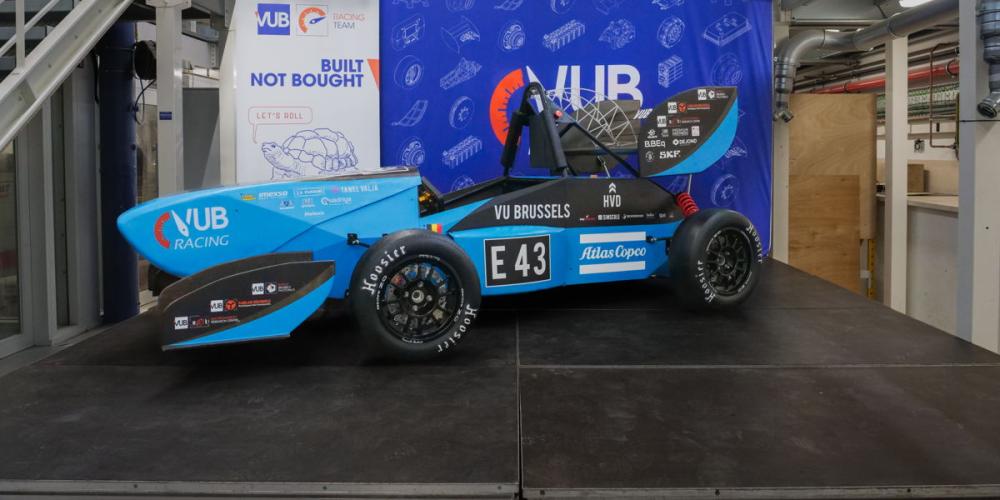
Electric cars are conquering the world, including the racetracks. The students of VUB Racing built an electric race car for the Formula Student racing competition. This year, the team is fully committed to innovation by using 100% bio-composites—a world first in the Formula Student circuit. “The car stands out because of the material we’re using this year: flax fibers,” says VUB engineering student Alexis Salmon. “Producing this bio-composite generates far fewer greenhouse gases—37 times less than traditional carbon fiber. Additionally, the fibers are biodegradable, making them a sustainable alternative.”
“Traditionally, motorsport relies on carbon fiber,” explains Salmon, VUB Racing team manager. “Its production is extremely polluting and the material is difficult to recycle. Recycling requires temperatures between 450°C and 700°C in an oxygen-free environment. Flax fibers, in contrast, produce 37 times less emissions and are fully biodegradable at 300°C. By using bio-composites, we promote a culture of innovation within our team. Pushing the limits of sustainable technology encourages our members to think creatively, experiment, and develop advanced solutions. This benefits not only our racing team but also contributes to sustainable practices in the automotive industry as a whole. That mindset of environmental responsibility extends beyond our team and shapes our professional decisions and actions.”
As in previous years, the car was built under the motto “Built not bought.” “That means we try to manufacture as many parts as possible ourselves instead of buying them,” says deputy team manager and VUB student Sam Dilmaghanian. “This year, we are also building our motors from scratch. Only a handful of Formula Student teams design and manufacture their own motors. A new year means a new challenge for us: designing and building a better motor. But it doesn’t stop there—our chassis, battery, spoilers, and diffusers are all self-made. For us, that’s the essence of Built Not Bought. We believe that designing every component ourselves makes us better engineers and a stronger racing team.”
The project involves 36 VUB students from the faculties of Engineering, Science and Bioengineering, Arts and Philosophy, Social Sciences, and the Solvay Business School. “We focus heavily on the technical aspects where electronics, mechanics, and aerodynamics intersect,” says Salmon. “But there’s much more involved: we have a student from Applied Linguistics handling communication, computer science students working on our autonomous driving platform, and business engineers helping with partner acquisition.”
Students worked on the self-built car at the Fablab Brussels (VUB). “We can independently produce parts for the car using the available 3D printers, laser cutters, and milling machines,” Salmon explains. This gives students practical experience for the job market. They apply theory in practice, while also learning project management and teamwork. “As a member of VUB Racing, I’ve taken on leadership roles, such as managing subteams and coordinating projects,” says engineering student and head mechanic Hendrik Heidbuchel. “It’s helped me develop essential leadership skills like decision-making, time management, and motivating others toward a shared goal.”
Formula Student is an international design competition for engineering students. “With our new car, we will compete in international races this summer to represent VUB,” says Salmon. “This year, we’re going to the Netherlands and the Czech Republic.” Participation is not guaranteed—students are first tested with technical quizzes. About 200 teams were reduced to 40 based on their results. “In the Netherlands, 40 universities from nine countries will compete in the electric class. Last year, we placed mid-field among Belgian teams. With the team size doubled this year, we can better leverage each member’s strengths. We hope to perform better this year and finish as the top Belgian team.”